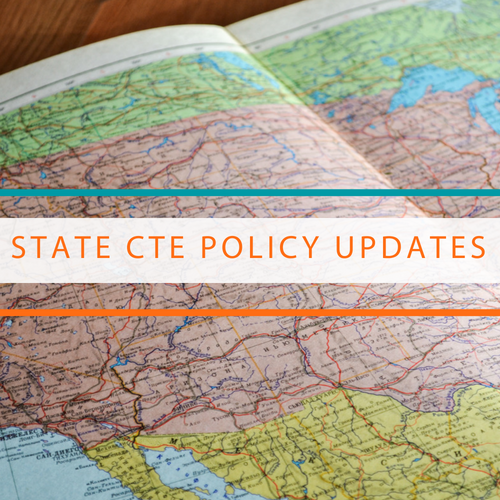 State education agencies, legislators and educators faced significant challenges from the coronavirus pandemic, including adapting to remote and hybrid delivery of hands-on learning, and responding to local and national skilled labor shortages. The number of state-level CTE policies enacted that affect Career Technical Education (CTE) fell to the lowest number in 2020 since Advance CTE and the Association for Career and Technical Education (ACTE) began publishing these annual Year in Review reports.
State education agencies, legislators and educators faced significant challenges from the coronavirus pandemic, including adapting to remote and hybrid delivery of hands-on learning, and responding to local and national skilled labor shortages. The number of state-level CTE policies enacted that affect Career Technical Education (CTE) fell to the lowest number in 2020 since Advance CTE and the Association for Career and Technical Education (ACTE) began publishing these annual Year in Review reports.
However, with a new commitment to upskilling and reskilling American learners and a CTE without limits, 41 states enacted 138 policies impacting CTE and career readiness in 2021. Advance CTE and ACTE have witnessed the return of pre-pandemic numbers in state policy actions in 2021 with policies affecting the secondary, postsecondary, adult and/or workforce systems, and including legislation, executive orders, and budget provisions that significantly changed funding.
Each year, Advance CTE and ACTE publish a yearly state policy tracker and categorize each state policy action by topic. In 2021, the top five topics that state policy most frequently addressed were:
- Funding;
- Access and equity;
- Data, reporting and/or accountability;
- Industry partnerships and work-based learning; and
- Industry-recognized credentials.
Data, Reporting and/or Accountability
Policies that address data and research activities that support CTE, including the use of labor market information and the inclusion of career readiness indicators within accountability systems have been categorized by this topic. Twenty-three states enacted 37 policies that address data, reporting and/or accountability. Below are a few state policy actions from this category:
- Hawai‘i enacted a law requiring the State Board of Career and Technical Education to oversee and review data processes related to industry-recognized credential attainment and publish an annual report to all stakeholders. The law also dictates that the Department of Education must share industry-recognized credential data through the statewide longitudinal data system and expands requirements to store and analyze CTE data in this data system.
- Maryland defined terms such as industry certificate, license, industry certifier and vocational certificate, among others, to ensure consistency in data collection and reporting for the Maryland Longitudinal Data System. The law also requires that licensing authorities and industry certifiers comply with the data requirements, data security plan and implementation schedule for the Maryland Longitudinal Data System.
- Missouri enacted the Students’ Right to Know Act, which requires that the state Department of Higher Education and Workforce Development provide an annual report on in-demand jobs in the state; the average cost of public institutions of higher education and vocational schools; completion rates of apprenticeship, high school credential and CTE programs; and the average starting salary for graduates of public institutions of higher education and vocational schools, among other data.
State Policies Impacting CTE: 2021 Year in Review marks the ninth annual review of CTE and career readiness policies from across the United States conducted by Advance CTE and ACTE. This report does not describe every policy enacted within each state but instead focuses on national policy trends.
View the full report and 2021 state policy tracker here.
Dan Hinderliter, Senior Policy Associate
Tags: ACTE, Coronavirus, Hawaii, Maryland, Missouri, state policy

